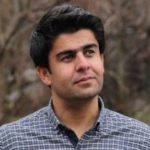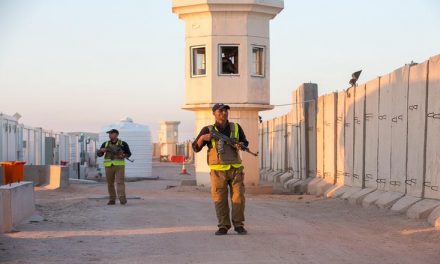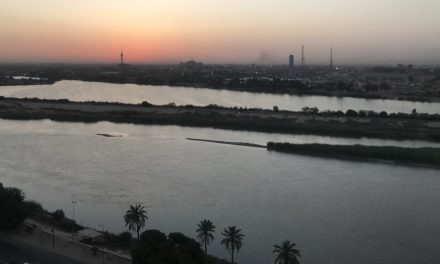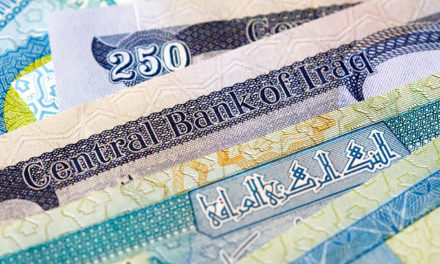(Masrour and Nechirvan Barzani. Photo: Waar Media)
Almost 100,000 registered martyrs exist in the Kurdistan Region of Iraq (KRI) whose relatives are on the payroll of the Kurdistan Region’s Ministry of Martyrs and the Anfal [Genocide] Affairs. The 100,000 martyrs include the Peshmerga who fought against the former Iraqi regimes since the 1960’s, the victims of genocide campaigns starting at the end of 1970’s, the victims of wars, prisoners hung or killed under torture, the victims during the Kurdish exodus in 1991 and the ones who were killed during the fight against Da’ish. Those people died for principal slogans of the revolution; freedom, social and economic justice and democracy for the Kurdish people so that the Kurds will have self-rule in the northern governorates of Iraq. Is freedom worth dying for? Definitely. However, has the freedom the Kurdish people fought for been achieved? It’s very questionable.
Many international media outlets and academics romanticize the rule of the Kurdistan Regional Government (KRG) for different reasons, and they only show one side of the story. When Iraq experienced its worst days post-2003, the Kurdistan Region was quite stable, and economically developing. American and European media were so interested in legitimizing the invasion of Iraq, they focused on showing the stability and economic growth in the Kurdistan Region. Meanwhile, the KRG spent millions of dollars on lobbying and international public relations. Several foreign scholars were also paid by the KRG to tell the success story of the Kurdistan Region. All this happened while free Kurdish media that told the other side of the story was never able to establish an English platform to report the real story. In this piece, I will try to tell the other side of story.
Despite the romanticization of the Kurdistan Region in the midst of regional unrest, the reality is once again that Kurds in Iraq are forced to choose between bad and worse: corruption, nepotism, and repression on one hand, or civil war on the other. These choices are bad and worse not only for Kurds, but for political and regional stability, as the landscape for power sharing between the two ruling clans remains tenuous and allows for exploitation by regional powers. Whenever people have started to take to the streets to ask for their rights of freedom and social and economic justice, the two ruling parties have not hesitated to kill them.
Like many revolutions around the world, the first thing the Kurdish armed-turned-political elite did following the Kurdish mass uprising in 1991 was betray the very foundations and values of the Kurdish revolution. Immediately after, the two main armed parties the Kurdistan Democratic Party (KDP) and the Patriotic Union of Kurdistan (PUK) arrived in the cities and began looting the former Iraqi Government facilities. One of the biggest dams the Iraqi Government had started to build in the Kurdistan Region which has been completed by 30 percent, the Bekhma Dam, was looted by the KDP and the PUK, just to name a few. Following a power-sharing agreement, the two parties soon divided the resources between themselves. And when their agreements did not go well, they started a bloody civil war in 1994 and in 1996 they divided the Kurdistan Region into two separate administrations; PUK-led Sulaimani and KDP-led Erbil administrations. Despite the efforts by the Clinton administration to bring peace in 1998 through the Washington Agreement between the two parties, the agreement was never fully implemented.
After the 2003 U.S.-led invasion of Iraq, the two parties came together to unify the Kurdistan Regional Government (KRG), however, they halved the resources and revenues. Although the KRG is theoretically a unified government now, in reality, the KRG is still divided between the KDP and PUK. The two parties have purposely never put an end to their differences, partly because they cannot overcome their years of bloodshed and hatred between themselves and mainly because they want their rivalry to remain so that they can continue the status quo, because the end of the rivalry will put them in a position to bring about real reforms and exchange of power; people choose to accept the status quo as long as the two parties continue their rivalry without resorting to bloodshed as people prefer the current status quo to the days of bloodshed in the 1990’s.
The most renowned and critically-praised poet in modern Kurdish history Sherko Bekas, who partook in the Kurdish revolutions and wrote poems before 1991, wrote his greatest text during the February 2011 protests criticizing the KRG’s then-19 years of reign. Let us not forget that Bekas was not allowed to recite his work in public, he chose a semi-underground place similar to the days of the former Ba’ath regime. There is no greater Kurdish poet who could have attributed his poetry to the Kurdish revolutions, and his “Now a Girl is My Homeland” could be the greatest poetic critique of the KRG’s reign. In one of the lines Bekas says: “Hey homeland…now the children are afraid of you. The women close their doors as they see you. If it continues like this, one day you die in solitude, and along with your casket, only the smugglers and thieves walk along whom you turned to princes and bosses.”
Kurdish dreams for freedom are no longer being killed by non-Kurdish oppressive regimes in Iraq anymore following 2003. The dreams for democracy, freedom and social and economic justice became paralyzed on February 17, 2011 when the KDP and the PUK opened fire against anti-corruption protesters. Ever since, the Kurdish peoples’ dreams are going in vain year after year.
In September 2017, the President of the KDP, Masoud Barzani led a referendum for independence of the Kurdistan Region. This signaled Barzani’s wish to put the last nail in the coffin of the KRG’s democracy. Although the referendum failed, his will to turn the KRI into a total family business did not. Along with the Barzanis’ will to further turn the region into a family business, there are also two families doing the same within the PUK; the Talabani family and the family of acting PUK Secretary General, Kosrat Rasul. Likewise, although to a smaller extent, the two sons of the founder and former leader of the Change Movement (Gorran), Nawshirwan Mustafa have also expanded their influence to the extent they can make strategic decisions regarding the movement.
In the beginning of December, the former President of the Kurdistan Region and President of the KDP, Masoud Barzani nominated his eldest son Masrour Barzani who is currently the chancellor the Kurdistan Region Security Council (KRSC) to the post of Prime Minister, and Nechirvan Barzani who is currently the Prime Minister of the Kurdistan Region for the post of the Kurdistan Region’s Presidency. Media sources also have hinted that Masoud Barzani’s younger brother Waysi Barzani who currently leads the KDP’s counter terrorism service to the post of the Chancellor of the KRSC. All in all, three Barzanis from the same family replace three other Barzanis.
In a similar move, the PUK has also prepared the Talabanis to lead the PUK in the new KRG cabinet and the parliament; the younger son of Jalal Talabani, Qubad Talabani, who is currently the deputy Prime Minister of the Kurdistan Region and Begard Talabani who was secretary of the Kurdistan Parliament. Jalal Talabani’s elder son Bavel Talabani has no official position in the KRG nor in his party, but takes on the role of secretary general of the PUK, allowing him to be a powerful figure when making deals with Baghdad, Iran and the KDP. Without his support, it would have been impossible for Barham Salih to become the President of the Republic of Iraq. Kosrat Rasul’s sons have also been prepped to take key positions in the PUK and the KRG. Kosrat’s older son, Shallaw is already a council member in the PUK leadership, handling a lot of the PUK’s affairs in Erbil. Rasul’s younger son, Darbaz is the KRG’s Minister of Reconstruction and will likely take on another high position in the upcoming KRG cabinet.
Although it is not clear if Gorran will participate in the new cabinet, the most likely scenario is that it will. If so, the Gorran figures who will take positions in the new KRG cabinet will most probably be those who are already controlled by the two sons of Nawshirwan Mustafa; Chya and Nma.
Some outside the Kurdistan Region question if the people are not supportive of these families, why can they win in elections? For instance, Quabd Talabani won the majority of the PUK’s votes and became the number one candidate in the KRG elections on September 30. Those that ask miss a few points: first, the majority of the Kurdistan Region’s citizens decided not to vote; second, the turnout was under 40 percent but the KDP and the PUK conducted massive electoral fraud that changed the results; third, the KDP and PUK have established a rentier system that finances the members and supporters of their political parties; the two parties have absolute control over their armed militias, i.e, the Peshmerga and the Asayish [Kurdish security] forces; fourth, buying votes during the elections through redistribution of the KRG’s public budget; fifth, both parties have large media corporations that dehumanize political rivals and fool the masses, all while being funded by the public budget; and lastly, threatening to resort to violence if either lose the elections.
The Kurdistan Region is undergoing a crucial time where the Kurdish crown princes’ infighting will eventually victimize Kurdish dreams for democracy and freedom. More dangerously, the Kurdistan Region and its parties will further be exploited by the regional powers, especially Iran and Turkey as the crown princes need regional support to secure their throne. Turkey and Iran are also interested in these undemocratic behaviors as it allows them to further bring them under their control. Russia has also reestablished its leverage in the region by bailing out the KRG and exploiting their weakness during the referendum and standoff with the Government of Iraq. This also helps the Iraqi militia leaders to come together with the crown princes to maintain the status quo. Therefore, the European Union and U.S. who helped the KRG thrive at one point, should not leave the Kurdish democratic voices alone. If the fight for democracy is obstructed, the footprints of Turkey, Iran and Russia will squeeze the U.S. and European Union in the region.
The KDP-PUK power struggle throughout history, especially in the 1990’s, provided a space for Turkey and Iran to shape Kurdish politics to fit their strategic policies in the Kurdistan Region and Iraq. The power struggle and race to control resources and hold positions in Erbil and Baghdad today has allowed the Turks and Iranians to exploit and influence KRG policy more than ever before. The Kurdish crown princes will be approaching both Iran and Turkey to strengthen their roots in the foundation of the KRG’s institutions as the two states now have such a strong say in the Kurdistan Region.
The homeland is no longer the homeland we knew before. We were taught in primary schools that “Kurdistan is our Religion, our Credo,” but that Kurdistan has been stolen from us. The Kurdistan our martyrs died for is not this Kurdistan the KDP and the PUK turned into monarchy-like where people are treated as third class citizens. The homeland is no more the one Sherko Bekas dreamed of, but rather a homeland where Kurdish crown princes are shaping.

Kamal Chomani
Kamal Chomani is a Nonresident Fellow at the Tahrir Institute for Middle East Policy.










